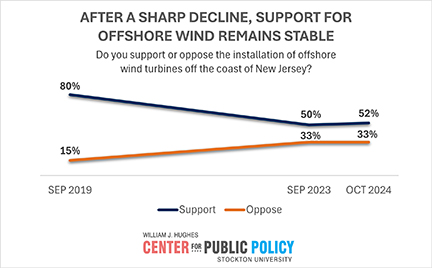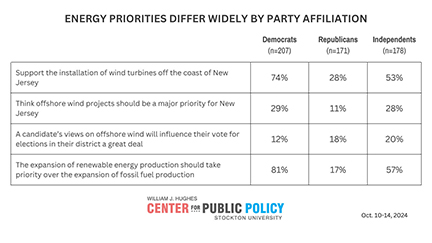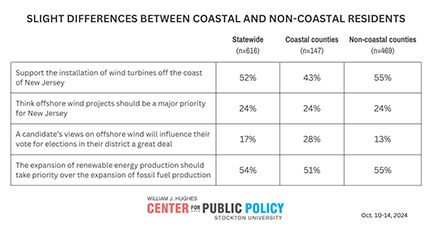Poll: Offshore Wind Not High Priority for N.J. Voters
Galloway, N.J. —Offshore wind projects are not a high priority for New Jersey voters, including those who support wind turbines, according to a Stockton poll released today.
Just over half (52%) of voters somewhat (24%) or strongly (29%) support the installation of offshore wind turbines off the coast of New Jersey, while 9% somewhat oppose and 24% strongly oppose. These rates remain stable since a September 2023 Stockton poll. That poll found a sharp decline in support since the previous iteration in 2019.
When voters who oppose wind turbines were asked for their top reason, most (51%) cited environmental concerns for marine life or the ocean ecosystem, followed by costs (8%), including the cost to produce turbines or the energy costs associated with their use.
Support aside, offshore wind projects are not a big priority for most New Jersey voters. Only 24% said offshore wind projects should be a major priority for the state, while 37% said they should be a minor priority and 29% said they should not be a priority at all.
When it comes to elections in their district, 17% said a candidate’s views on offshore wind would influence their vote a great deal, 41% said it would influence their vote somewhat, and more than one-third (37%) said it would have no impact on their vote, including 40% of voters who back wind turbines.
“No matter which side of the issue voters land on, they seem to agree that it’s not a top priority,” said Hughes Center Research Director Alyssa Maurice. “The opposition to offshore wind is particularly vocal and well-organized in New Jersey, but the poll shows that for most voters this issue doesn’t move the needle much.”
Voters in coastal counties and those who oppose wind turbines were slightly more energized by the issue of offshore wind, with 28%-29% saying a candidate’s views on the matter would impact their vote greatly.
A majority of all New Jersey voters (54%) said expanding the production of renewable energy should take priority over expanding the production of fossil fuels, while 37% said fossil fuels should take priority when it comes to energy supply.
Gaps between Democrats and Republicans persisted on almost all measures related to offshore wind, but the largest were identified on this question regarding energy production. A majority (77%) of Republicans favored fossil fuel production over renewables.
Smaller differences were found by geographic location. Similar to what was found in 2023, coastal residents were less supportive of the installation of offshore wind turbines. However, they were aligned with all other voters in their support of renewable energy production in general and on whether offshore wind projects should be a major priority for the state.
The poll of 616 registered voters was released by the William J. Hughes Center for Public Policy at Stockton University. The margin of error is +/- 3.9 percentage points.
You can find the full poll results here.
Methodology
The poll of New Jersey registered voters was conducted by the Stockton Polling Institute of the William J. Hughes Center for Public Policy from Oct. 10-14, 2024. Stockton University students texted cell phones with invitations to take the survey online and Opinion Services supplemented the dialing portion of the fieldwork, which consisted of cell and landline telephone calls. Overall, 91% of interviews were conducted on cell phones and 9% on landline phones. In terms of mode, 65% were reached via dialing and 35% were reached via text-to-web. A random sample of 616 New Jersey registered voters were interviewed. Both cell and landline samples consisted of random digit dialing (RDD) and voter list sample from MSG. Data are weighted based on U.S. Census Bureau ACS 2023 data for the citizen voting age population in New Jersey on variables of age, race, education level, and sex. The poll's margin of error is +/- 3.9 percentage points at a 95% confidence level. MOE is higher for subsets. Sampling error does not account for other potential sources of bias in polls such as measurement error or non-response.
About the Hughes Center
The William J. Hughes Center for Public Policy at Stockton University serves as a catalyst for research, analysis and innovative policy solutions on the economic, social and cultural issues facing New Jersey, and promotes the civic life of New Jersey through engagement, education and research. The center is named for the late William J. Hughes, whose distinguished career includes service in the U.S. House of Representatives, Ambassador to Panama and as a Distinguished Visiting Professor at Stockton. The Hughes Center can be found on YouTube @StocktonHughesCenter, and can be followed on Facebook @StocktonHughesCenter and X @hughescenter.





